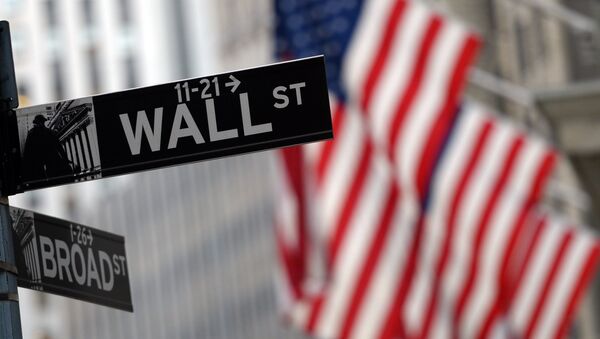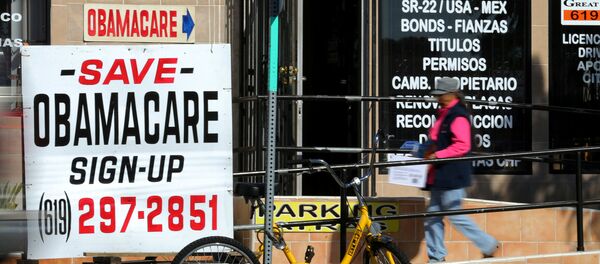It is yet unclear whether the new initiative will fully repeat the letter of the initial drafts of the CHOICE Act, briefly outlined last year, but the discussed legislation will be essentially similar in spirit, aimed at easing regulation in the banking and financial sphere of the US economy.
Hensarling currently is the chairman of the House Financial Services Committee, and he said that on April 26 the banking panel will start discussing the replacement for Dodd-Frank, which was adopted in 2010.
"Republicans are eager to work with the president to end and replace the Dodd-Frank mistake with the Financial CHOICE Act because it holds Wall Street and Washington accountable, ends taxpayer-funded bank bailouts, and unleashes America’s economic potential," Hensarling (R-TX) said.
Under the provisions of The Dodd–Frank Wall Street Reform and Consumer Protection Act, referred to as Dodd-Frank, the US commercial banks have to hold increased volumes of capital as reserves, which limits credit issuance among smaller lenders. Dodd-Frank is therefore seen as holding back US investment in the non-financial sector of the economy (Main Street, as opposed to Wall Street).
Republicans insist that Dodd-Frank hardly made the US financial system more sustainable as it had little to no effect on the lending practices of major Wall Street banks. Besides, the issue of governmental bailout of the too-big-to-fail (TBTF) banks remains unresolved, meaning that in the case of a new financial meltdown, taxpayers’ dollars will still be used to extinguish the fire on Wall Street, while Main Street lenders will likely simply cease to exist.
The CHOICE Act in its original form, announced last year, suggested that banks should not be obliged to hold significant reserves, which would allow smaller community banks to increase the scale of lending, enjoy greater commercial revenues and spur US economic activity in small towns and rural regions. Under the new proposal, banks will be fully responsible for their own sustainability, and if they fail as a result of imprudent business practices in times of turmoil, they should be allowed to fail.
An earlier draft of the CHOICE Act passed the Committee in 2016, before Donald Trump was elected President, but now Congress as a whole will review the proposed legislation.
Hensarling’s initiative, however, is poise to face stiff opposition in Congress from both the Democrats (essentially), and even some Republicans. Eight or more Democrats will be required to back the legislation for it to pass in the Senate, and the ambitious financial sector reforms are not something that many Wall Street bankers, who back some Congress Democrats, will be happy with.
"Dodd-Frank failed to keep its promises to the American people, but we will work with President Trump to follow through on his promise to dismantle Dodd-Frank," Hensarling said. "That's not what Wall Street wants, but it is what hard-working Americans need to have a healthier economy with more opportunities so they can achieve financial independence."
The TBTF clause will probably be the pinnacle of the debate. It is in the interests of Wall Street investment banks to ensure that their businesses are backed up with money from the federal government’s budget, no matter how beneficial or malicious those might be overall.
The CHOICE Act in its 2016 edition would return the banking system to its market-based foundations, where the lender of last resort would be the US Federal Reserve. Wall Street banks, however, if they fail, would have a hard time getting Fed money as the regulator is currently seeking ways to decrease its already bloated balance sheet (at about $4 trln as legacy of the Obama-era economic policies compared to below $1 trln in 2008).
Another provision of the CHOICE Act significantly restrains the authority of the Consumer Financial Protection Bureau (CFPB), while allowing Congress to oversee its activities more strictly. The CHOICE Act is thus devised to increase the transparency in the US government’s economic tinkering, wherever parts of the existing rules and regulations would remain in place. A higher degree of transparency will likely be achieve through the ongoing partisan struggle – while many watchdog agencies are run by Democrats, the Congress Republicans will be more than eager to look into their work for political reasons.
Democrats in Congress will stiffly battle every provision of the CHOICE Act, of course, meaning the GOP will have a hard time getting their legislative initiative approved at all levels and at a pace which is quick enough. The Trump administration, on the other hand, has yet to discuss in detail how it intends to tackle the abundant overregulation of the US economy, which is gradually grinding to a halt at below 1pc annual growth.
Never miss a story again — sign up to our Telegram channel and we'll keep you up to speed!




